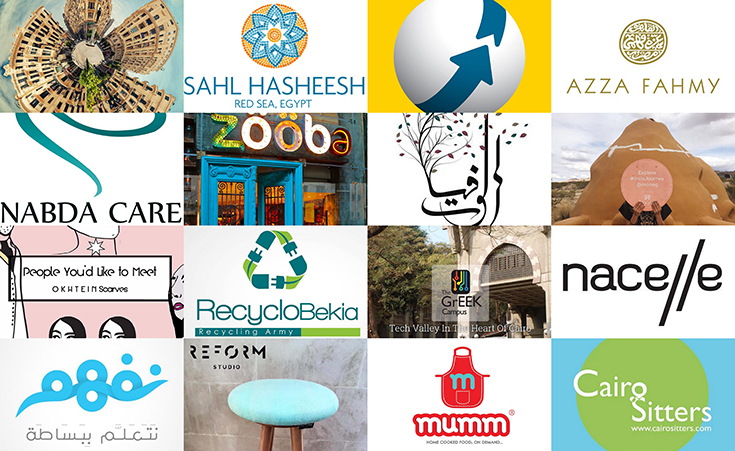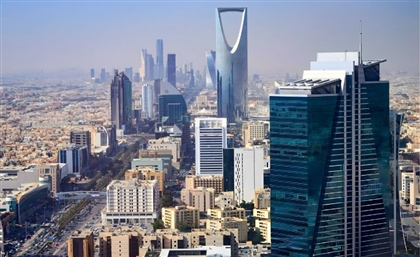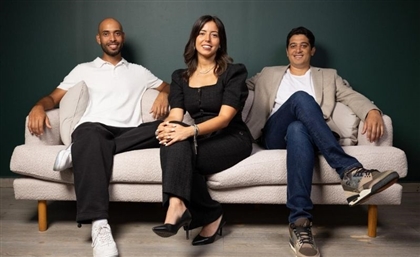25 Incredibly Disruptive Companies in Egypt
Vibrant, daring, and authentic, these 25 Egyptian companies are rejecting conventions, impacting entire communities, and boldly leading new consumer trends.

They break conventions, set new behaviors in motion, and shift perceptions. They daringly create new standards for what is “normal;” so much so that competitors have no choice but follow –or become obsolete. That’s what disruptors do. They not only change the trajectory of consumers’ viewpoints, but also that of the marketplace.
As companies tend to innovate faster than their customers’ needs evolve, being innovative does not always guarantee success. Many startups end up producing products that are too expensive or complicated for customers in the market. Products that, perhaps, may take longer to take root in Egypt. Disruptors, on the contrary, understand consumer trends before they become trends and reach the top of the game.
And, while the latest years have seen a massive disruption of global startups whose ideas rippled across the Middle East - such as Uber - Egypt’s business landscape has seen the rise of innovative ideas along and across business. These are some of the 25 most earth-shattering.
1. Al Ismaelia for Real Estate Investment, for taking it upon themselves to restore Downtown Cairo’s grandeur, a mammoth of a task that is profoundly changing the way urban planning is done. They've bought, repainted, and renovated 23 historical buildings, including the iconic Radio Cinema, Shorbagui building, and the Old French Consulate. An unpredictable force of urban change, they constantly set initiatives in motion, such as a weekly walking tours, and Khotout West El Balad, a project to research and develop the heritage of street sign typographies.
2. Karm Solar, for setting off to change the country’s farming methods and daring to compete with public institutions in the energy sector. Having developing an award winning high-capacity solar pumping station, they boast the region’s largest off-grid hybrid pumping and irrigation system (147 kW), which helps desert farmers pull up underground water without using diesel-powered pumps.
3. Bey2ollak, for capitalising on crowdsourcing and collaborative economy to tackle an issue that, according to the World Bank, costs Egypt 47 billion LE every year: traffic. For stepping up to partner with international giants such as Uber and adapting to consumer values.
4. Recyclobekia, for finding gold amongst garbage in one of the world's most polluted cities. Mostafa Hemdan’s company, conceived when he was a 20-year-old student, has grown to become the first start up in the Middle East to generate revenue from recyclable material inside electronic waste.
5. Helm, for turning the disability conversation upside down and facing it from a productive standpoint. For involving the private sector in improving accessibility in ways far more productive than CSR. “We don’t have a charity approach; we don’t serve people with disabilities, they are part of our team and we work with them,” Co-Founder Ramez Maher told CairoScene.
6. Nacelle, for creating a cultish-like trend in the nightlife and entertainment sector and reviving forgotten venues (such as Mohamed Aly Club), and now filling an untapped gap in family daytime events with FamJam. Each of Nacelle’s new concepts has been the first of its kind, setting trends and creating consumer advocates, whether it is their Funk n’Pop or B-Side.
7. Fawry, for changing the way people pay the bills. In Egypt’s highly informal economy, the e-payment company made waves through utilising a network of small, local convenience stores and kiosks around the country. This year, in one of the largest tech acquisitions in the Arab world, it was acquired for $100 million.
8. The Greek Campus, for getting ahead of the game and setting up the Middle East’s own Silicon Valley, instead of waiting for it to come about. The campus today hosts nearly 50 startups, as well as Cairo’s most cutting-edge events.
9. Zooba, for visualising the heritage within Egyptian street food and leading the trend in high-end street food. The brand has become an ingrained persona in the market and made waves globally; so much so that it is representing Egypt at the upcoming London Falafel Festival.
10. Okhtein, for blending fashion with genuine art and aggressively entering the global market by personally researching out to celebrities’ stylists. “It was a plan we had from the beginning. We thought: if we want to do this, we will do it big,” Co-fFunder Mounaz Abdel Raouf told CairoScene, as pictures of their purse worn by Emma Watson flooded social networks and fashion sites.
11. Educate.me, for defying public education and introducing a different model, directed not to the rich and powerful, but the poor. Cayton Christensen says that disruptive innovations allow “a whole new population of consumers at the bottom of a market access to a product or service that was historically only accessible to consumers with a lot of money.” This is exactly what Educate.me does.
12. Sahl Hasheesh, for changing the way tourism is thought of and taking up the gargantuan task of building cities from scratch. The sole provider of infrastructure networks including water, sewage, electricity, telecommunications, roads, and community services, Sahl Hasheesh’s model was replicated by other Egyptian seaside resorts, creating fully integrated resort cities where people can live.
13. Otlob, for capitalising on societal customs and creating a massive consumer behaviour, leading the online ordering trend that would balloon across the Egyptian society -where delivery is a deeply ingrained behaviour - and become followed by many.
14. Cairo Sitters, for disrupting a heavily informal, trust-reliant service, adding educational value and sowing the seeds for an inexistent culture of a part-time job. The company’s inception was triggered by one thought: “I would never leave my child with a nanny like that. And we realised there’s demand from both the parents' side and young adults that are looking for part-time work,” Co-Founder Hossam Taher told CairoScene.
15. Azza Fahmy, for turning a craft into an empire by tapping into a cultural value. “For Arab women, jewellery is their bank, their investment and their safety. The tradition comes from peasant people. They don’t put money in the bank; they put it in their hands through precious jewellery, which they can sell whenever they need,” she told CairoScene.
16. INCA, for using the power of storytelling to incorporate a massively young demographic to a sector traditionally limited to household shopping. “We are inspired by unconventional travels. We design handmade fabrics inspired by the stories and cultures of different cities; there’s a Marrakesh story, a Mykonos story, a Mexico story, and they each pay artistic homage to that place,” said Co-Founder Mostafa El Nahawy in an interview with CairoScene last August.
17. Wuzzuf, for beating giants. Last year, they made headlines globally as they secured Egypt’s Largest Funding Round, led by European VCs Vostok New Ventures (from Sweden) and UK-based Piton Capital. In a market dominated by global giants (online recruitment), the startup mastered job matching algorithms and helped 50,000 people find jobs in across 4,000 companies in Egypt.
18. El Wafeyat, for altering the business of death and driving an incursion into social obituaries. “It's the 21st century, and everything is digital; why publish an obituary in the local newspaper for $1000, when an online service only costs a fraction of the price?” Co-Founder Nesma El Far tells CairoScene.
19. Mumm, for looking at an underserved labour market – stay-at-home moms – while tackling gender inequality. Their model sets out to enable cooks to earn about 6,000 LE per month, not only enhancing the quality of delivery food but also utilising labour that was previously overlooked.
20. Riseup Summit, for putting the global spotlight on Cairo. “Enter if you will help this team change the world,” reads their office door, set at the heart of The Greek Campus. Three years ago, Abdelhameed Sharara set out to bring the world to Downtown Cairo, to witness and take part in the startup movement shaking the entire nation and rippling onto the Middle East. Today, they are not only the primary go-to company when it comes to the entrepreneurial scene, but they are also in constant evolution, redefining themselves and taking on new challenges.
21. Nabda, for creating electronic medical records in a country where most hospitals still document on paper. The cloud-based medico-social platform is on its way to change consumers' perceptions of healthcare, enabling connectivity between all healthcare stakeholders. With offices in Egypt, Kuwait, and the USA, NabdaCare operates in the region’s major hospitals.
22. Nafham, for understanding the shift to a sharing economy, and capitalising on the power of crowdsourcing to create educational videos.
23. Usertalk, for helping the helpers. Their simple idea - a cloud-based call centre software tailored for SMEs - required educating the market, but they are now competing on an international level with far more enhanced qualities than their initial regular push-to-talk ambitions.
24. Instabug, for developing for developers. Last time we spoke to them, they were approaching giants like Facebook and Google to explore collaboration; their bug-tracking app is one of the most renowned startup success stories in Egypt, currently managing 70 percent of their operations abroad and serving 25 million users worldwide. “We were really looking forward to meeting our potential consumers: Google, Facebook, Evernote, Apple, Pinterest, Dropbox... We made sure to meet the top of the top,” Co-Founder Omar Gabr told CairoScene.
25. Reform Studio, for making recycled products cool and triggering a social trend. Their model is creating consumer advocates and sparking a recycling trend followed by many in both the fashion and design scene.
- Previous Article Bassita: Click Funding for a Better Egypt
- Next Article New App Lets You Book A 'Vespa' For Your Next Ride






















